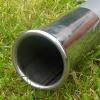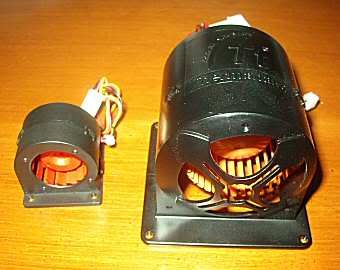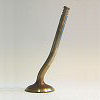'Fraid I'm going to have to dissagree with Trail of the Dead.
Lets also not forget that copper corrodes when in contact with water....another element that is present in our cooling system. Look at the statue of Liberty, corrosion IS an issue. Copper does have better thermal dissipation properties than Aluminum but Aluminum lacks the corrosion issue of Copper and it dissipates heat very well too. Not only that but if your a weight junkie then an Aluminum core would weigh less.
Aluminium also corrodes. Look at any of the aircraft on your base, they all have corrosion protection on their aluminium components.
The size of the core only matters if your able to utilize it. For example if you have a heater core the size of the radiator in your mini, you would have to have a source of heat that can heat it up fast. What do you think would heat a car up faster? A BIG heater core made of copper or a smaller heater core made up of aluminum?
The bigger heater made of copper. Radiators are specified in power dissipation for a given surface area (watts/cm
2 etc). A larger heater will dissipate more heat and this is why bigger engines have larger radiators than smaller engines. Small and large heater cores will heat up in a very similar time as there's really very little difference in their capacity compared to the volume of coolant in the whole system. It's possible to have a core that's concidered too large and can radiate more heat than you'll ever need, and it's possible to have a core that's too small and cannot radiate enough heat.
Lets take stars for reference. Lets say that hypothetically our Sun is the same temp as Betelgeuse (the biggest star in the constellation Orion...it would be Orion's left elbow as you are looking at him). Betelgeuse is MUCH, MUCH bigger than our Sun, so which one reached max temp faster? My money is on our Sun.
Not sure what you're drinking but I'll have a pint.

Now lets say a smaller heater core reaches a good toasty temp but a bigger heater core can get hotter in a longer time frame. Which one makes more sense? A bigger core that can reach 120 degrees Fahrenheit (about 48.8 degrees Celsius) or a smaller core that can reach 85 degrees Fahrenheit (about 29.4 degrees Celsius) in less time? I'd rather have the smaller core as I'd want to get toasty faster.
And I'll have the bigger heater. But how can the heaters will reach different temperatures if both are being supplied with water at (say) 85
oC?.
The engine you run makes a difference in this too. I'm sure a Chevy 350ci (5.7L) V8 can attain a higher operating temp faster than a standard 998cc A-Series engine. I would wager that a 1275 gets hotter faster than a 998 too. Obviously this all has to do with how big the combustion chambers/cylinders are which in turn determine how much fuel is going to get compressed then ignited during the "Squeeze" and "Bang" cycles. If you've got a more fuel/air then it's going to get hotter, faster.
I'll agree with you here.























